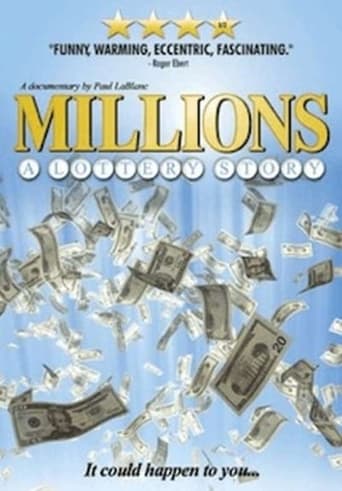jones-70
This is a really interesting and different kind of documentary. If you're looking for a feature length episode of MTV Cribs with a lot of bling and flashy cars or a solid gold doghouse, you should probably look elsewhere. Instead, this is a more leisurely paced and deeper look at the lives of a few lottery winners, some recent, some who won 20 years ago and spent their way through it all. It's fascinating to see the effect that wining the money had on these very average Joes and Janes. Rather than hitting you over the head, the movie is more multi-layered and rich in subtext. There's a lot going on under the surface. I thought it was happy, sad, funny and tragic, sometimes all at once. All in all a beautifully done documentary that makes you think. I think fans of Errol Morris and documentaries like Gray Gardens and Salesman will really enjoy this.
lee-baby
I thought when I rented this that it was going to be a little more of a study of the lottery that tried to show why it seems to be such a blessing for some people and more often a curse for others. While this film certainly touches on those subjects, for the most part the lottery is just used as a common thread that ties these different people together, and I was nicely surprised at how interesting their stories are and how candid they are in revealing their mistakes and fears. A lot of the film concentrates on Phylis, one of a group of small town Minnesota cafeteria workers who won a $100 million powerball lottery. While she is really sweet and is a great character, I personally was more drawn to Louie, a New York City electrician who was one of the first big lottery winners ever in the late 70s. To hear his stories of how his life was turned upside down by instant celebrity status, only to have it all taken away when he no longer had the money is a really fascinating comment on American society, and is as pertinent today as it was then (in many ways even more so). There is some great historical footage of him on all the big TV shows, hobnobbing with celebrities and living large, which is shocking in contrast to his life now in a rundown Florida retirement community. Also fascinating is the case of Curtis, Louie's friend and fellow winner, who similarly lost all of his lottery money but ended up a drug addict before becoming a minister to prison inmates. You genuinely get the feeling that he is happier without the millions of dollars, just because he is now working to help others. While the pacing is a little slow, I really loved hearing about these people's experiences, and by the end of the movie I really felt as if I actually knew these people. I'd be curious to see a follow up on them in a few years to see how their lives have further changed.
Eagles409
This documentary should serve as an example of how to make something that should be exciting and make it boring. When I read the description for this movie it sounded great, learning about several people who have won the lottery and how it has changed their lives. Well the people that did this documentary took this cool concept and made it as boring as possible. I was hoping to see interviews with these peoples friends and family, find out if they had changed. Interviews with the winners about whether or not family and friends started asking to borrow money. Stupid things they had purchased, what they had done with the money and what kind of major impact it had on their lives. This documentary has none of that, instead the only people that are interviewed are the people that won the actual lottery, none of their friends or family. The main portion of the documentary is taken up by a couple of people that were part of a larger group that won the lottery. They are all farmers from Minnesota and all seem like really nice people, but they don't do anything with their money and there is really nothing interesting about their stories. The other 2 people interviewed for this are both NY lottery winners from the 80's and they are both out of money. Both of them seem like they might have had very interesting stories, but we really don't get any of that from them. Since no friends or family are really interviewed either, we don't get much of the story. This documentary could have and should have been much better than it was, which is too bad.
